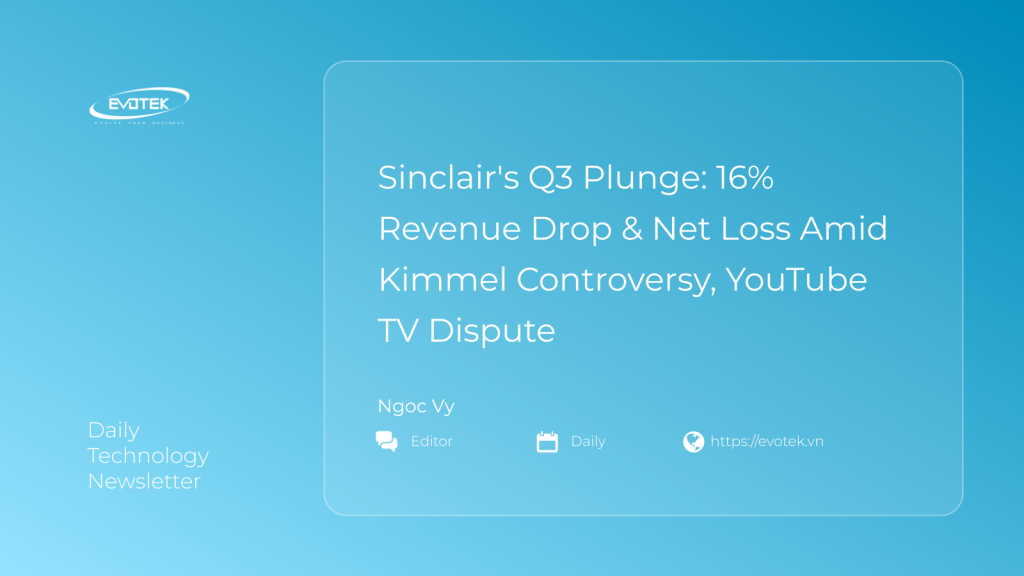Sinclair, a prominent U.S. television station conglomerate, reported a substantial decline in its third-quarter 2025 financial performance, swinging to a net loss amidst ongoing industry disputes and a prior boycott involving its ABC affiliates.
For the third quarter, the company posted revenues of $773 million, marking a 16% decrease compared to the previous year. This significant drop pushed Sinclair into a net loss of $1 million (or 2 cents per share), a stark contrast to the net income of $94 million reported in the same period last year.
CEO Addresses YouTube TV Blackout & Antitrust Concerns
During the earnings call, Sinclair President and CEO Chris Ripley voiced strong criticism against Disney and Google regarding the ongoing YouTube TV blackout, which has impacted 38 of Sinclair’s ABC affiliates. The dispute has led to the temporary unavailability of ABC, ESPN, and other networks on YouTube TV. Ripley labeled the situation an “antitrust issue,” asserting that local broadcasters are being “caught in the middle” of power struggles between these “media giants.”
Ripley emphasized Sinclair’s advocacy for regulatory changes, demanding that local TV station owners gain greater control over pay-TV distribution agreements. He highlighted the current dilemma where local broadcasters have “no say” in how their content, for which they pay to air, reaches local audiences. Sinclair has engaged with the FCC and antitrust regulators on this matter, advocating for an end to current practices which, according to Ripley, “continue to hurt local viewers and local journalism.”
Advertising Revenue Plummets & Kimmel Boycott Aftermath
A significant factor in Sinclair’s revenue decline was the advertising segment, which saw a 26% year-over-year drop to $321 million. This sharp decrease was largely attributed to substantially lower political ad sales, tallying only $6 million in Q3 2025 compared to a record $138 million during the 2024 presidential election cycle. Overall, the Media segment, encompassing broadcast TV stations, multicast networks, and original content, recorded $765 million, down 16%.
These financial results follow a controversial period in September when Sinclair’s ABC-affiliated stations briefly preempted “Jimmy Kimmel Live!” The boycott stemmed from comments made by host Jimmy Kimmel regarding the individual who murdered Charlie Kirk. While the extent of the boycott’s financial impact on Q3 results remains unclear, as the company did not address it directly in its earnings release or call, the incident drew significant media attention and regulatory scrutiny, including implied threats from FCC Chairman Brendan Carr.
Sinclair, known for its conservative leanings, initially pulled “Jimmy Kimmel Live!” after Kimmel’s remarks, which were interpreted by some MAGA supporters as blaming them for Kirk’s murder. The company stated its decision was independent of government influence, yet it echoed Chairman Carr’s calls for regulatory action to address network control over local broadcasters. After “ongoing and constructive discussions with ABC,” including the possibility of a network-wide independent ombudsman, Sinclair’s ABC stations resumed airing the show in late September.
Kimmel later addressed the controversy in an emotional monologue, stating his intention was never “to make light of the murder of a young man” and reiterated his message of compassion for Kirk’s family.
Strategic Review and Regulatory Outlook
Despite the financial challenges, Sinclair CEO Chris Ripley expressed optimism, noting the company “delivered a strong third quarter, achieving the high end of guidance for advertising and distribution revenue.” He anticipates “continued improvement in core advertising trends” and an increase in distribution revenue in the fourth quarter.
Sinclair previously announced a “comprehensive strategic review” of its broadcast business, exploring potential sales and acquisitions. Ripley also expects favorable regulatory changes from the FCC in the first half of 2026, including a potential increase or elimination of the 39% national ownership cap for TV stations. Furthermore, the FCC’s rule prohibiting a station group from owning more than one of the top four TV stations in a given market was recently vacated, paving the way for further industry consolidation.
As of November 1, Sinclair had finalized 11 partner station acquisitions, with more awaiting FCC approval and additional transactions planned. These acquisitions are projected to generate at least $30 million in incremental annualized EBITDA once completed. Looking ahead to 2026, Ripley foresees “record midterm political revenue” and anticipates that recent regulatory developments will lead to “much-needed industry consolidation and significant synergies for investors.”

 日本語
日本語 한국어
한국어 Tiếng Việt
Tiếng Việt 简体中文
简体中文